YEAR 2022: The year of political and economic chaos for Pakistan
- By Shakoor Nizamani -
- Dec 28, 2022

Year 2022 has entered its last month with the game of thrones in Pakistan has entered a critical phase. Former prime minister Imran Khan had earlier announced to dissolve the provincial assemblies of Punjab and Khyber Pakhtunkhwa having PTI’s government by December 23 but the decision later put off amid new moves from political opponents.
The country has witnessed its worst political tug of war throughout the year, having a destabilizing impact on the economy pushing it nearer to default.
Politics has become a game of cricket with rampant cricket vocabulary in use leaving the general public, the major stakeholder of Pakistan, into a shivering cold and economic uncertainty.
The political class and other stakeholders giving less attention to the people’s problems, awarding more and more attention to palace conspiracies and matters that have lesser or no tangible impact on the worsening conditions of the major segment of countrymen. Politics of the elite has been in play in the country with nothing that could provide most needed relief to the people, a lot of which have been still passing their nights on roads after unprecedented floods that destroyed their homes, made them displaced as the winter has started.
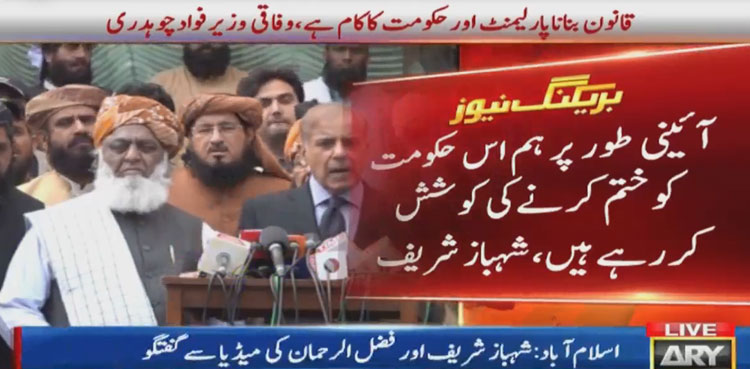
The PPP had a different opinion with regard to the proposal of resignations from the assemblies, which was being touted by the PML-N and some other parties in the opposition alliance the Pakistan Democratic Movement (PDM).
The PPP convinced opposition parties to take part in by elections, which were mostly won by the opposition. It also came with a political strategy to table the no-confidence motion in the National Assembly against the PTI government with an argument that resignations from the assembly should be a last resort option.
The opposition’s lawmakers submitted the no-trust motion on March 08 under Article 95 against the premier to the National Assembly Secretariat. The opposition had also filed a requisition notice seeking a session of the lower house of Parliament to table the no-trust motion.
PML-N’s Khawaja Saad Rafique, Marriyum Aurangzeb, Ayaz Sadiq, Rana Sanaullah, PPP’s Naveed Qamar, Shazia Marri and JUI-F’s Shahida Akhtar Ali had submitted the no-trust motion in the NA Secretariat.
Speaking at a joint press conference, the then-Leader of the Opposition Shehbaz Sharif said the motion was presented because of the government’s poor performance in economic and social sectors, also accusing poor governance, political victimisation of opponents, and mismanaging the economy and foreign policy during the three-and-half years tenure of the PTI government.
This was the beginning of a spell of political moves and counter moves between the opposition parties and the government.
The National Assembly Secretariat declared the no-trust motion submitted by the opposition parties, according to the rules after its scrutiny and verification of the signatures of the opposition members on the no-trust motion as well as the requisition notice for the assembly session.
The legislation department of the National Assembly completed its process and forwarded the file to the Speaker. It recommended the speaker to summon the assembly session any day before March 22. The NA Secretariat issued notices to MNAs regarding the no-confidence motion against PM Imran Khan. The notices were issued to the NA lawmakers along with a copy of the no-trust move in accordance with the assembly’s rules and regulations.
Federal government decided to summon the National Assembly session for voting on no-trust motion after the Organization of Islamic Conference (OIC) moot in Islamabad, which was scheduled for March 22 and 23 in Islamabad.
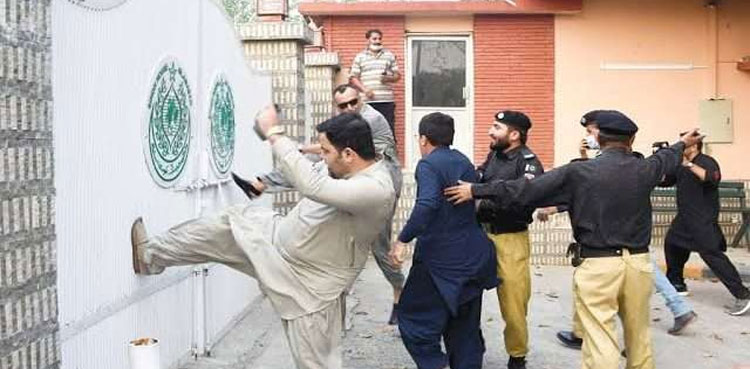
Sindh House Episode
In the lead up to the no-confidence motion, Imran Khan’s PTI also faced defections from some lawmakers, which boosted the opposition’s morale. The Sindh House in Islamabad became the center of attention amid tussle between the PTI government and the opposition after reports surfaced that several MNAs from the ruling PTI, were staying at the place before the vote of no-confidence motion against Prime Minister Imran Khan.
Raja Riaz — who left the PPP to join PTI in 2016 and after the 2018 general election joined the Jahangir Khan Tareen group within PTI — expressed defiance against Imran Khan. He disclosed that around two dozen PTI MNAs were at Sindh House. He alleged that the MNAs in his group were beaten up by the police and taken to the police station. He said that the police also raided the Parliament Lodges.
Defiant MNAs said that no one had offered them money, and they would listen to their conscience while voting on the no-confidence motion. Amid tensions between the government and opposition in the wake of the no-confidence motion, then information minister Fawad Chaudhry warned strict action against “the opposition’s attempt to buy the loyalty of PTI MNAs”.
A group of Pakistan Tehreek-e-Insaf (PTI) workers entered Sindh House premises after breaking the main gate during a protest in Islamabad on March 18 against dissident lawmakers, who had taken shelter at the Sindh House. Around a dozen of PTI workers were arrested, while two MNAs participating in the protest also surrendered before the police.
PTI defections created uncertainty in the allies, which felt at loss if the joint opposition succeeds in their no-trust motion against prime minister Imran Khan.
The allies expressed their reservations in talks with the government and posed the question, what if the opposition wins the vote of no-confidence against the government with support from the PTI defectors.
This likelihood of the situation, forced allied parties to engage in talks with the opposition to get a better deal for their political future. This dialogue, smartly handled by the opposition, created real prospects for the downfall of the PTI government.
In the end, two key allies of the government, the MQM-P and the BAP and some independents, changed their affiliation to the government to boost the opposition.
The PML-Q on the other hand over the promise of CM Punjab’s office from the PTI, withdrew its promise of support to the opposition in the no-confidence vote. However, this decision resulted in a rift between the two elders of the PML-Q.

Speaker’s Ruling
The National Assembly session to vote on no-trust motion, on April 03, was chaired by deputy speaker Qasim Khan Suri as the Speaker opted not to preside over the session.
Deputy Speaker Suri ruled to reject a no-trust motion against Prime Minister Imran Khan over having alleged links with the foreign conspiracy.
Earlier, federal minister Fawad Chaudhry claimed in an address in the house that the no-trust move was brought with the support of a foreign conspiracy and therefore the chair should give its ruling on the matter before deciding on the no-trust motion.
The deputy speaker ruled that it has been confirmed, the no trust motion is being brought forward with the international conspiracy and declared it as rejected. “The points raised by the law minister are valid and the no trust motion is against the constitution,” Qasim Suri ruled.

Supreme Court Verdict
The Supreme Court took suo moto notice of the speaker’s ruling on the no-trust motion against PM Imran Khan.
A five-judge larger bench, headed by Chief Justice Umar Ata Bandial, in a unanimous judgement declared the NA deputy speaker’s ruling and the subsequent dissolution of the assembly, to be contrary to the constitution and of no legal effect.
The top court ordered the National Assembly speaker to summon a session of the lower house of Parliament on April 9, to hold voting on the no-trust motion.
The SC ruling will not impact the effectiveness of Article 63 (A), the top court also ruled and directed the government not to stop any lawmaker from taking part in the vote of the no-confidence motion.
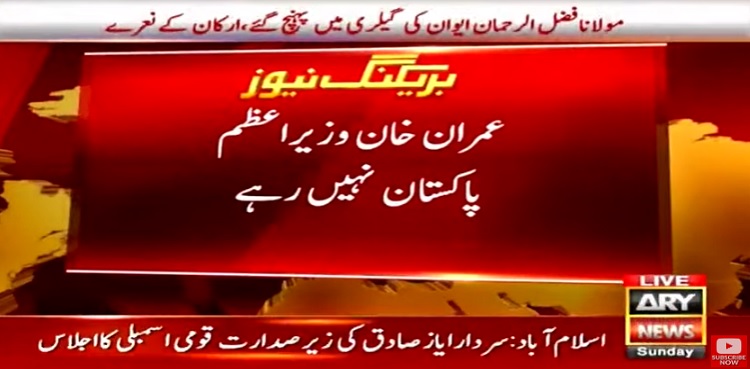
Fateful NA Session
The National Assembly session that began in the morning for the vote on the no-confidence motion protracted till midnight amid breaks. Speaker Asad Qaiser late in the night resigned from his office, he announced in parliament.
“I have decided, keeping in view the letter which I’ll share with the Supreme Court, that I can no longer stay at the office of speaker,” Qaiser said. “I’ll ask Ayaz Sadiq from the PML-N to come and complete the legal procedure (hold voting on no-confidence motion)”, he said.
In result of the vote, which succeeded with 174-0, Imran Khan was removed from the prime minister’s office. It was the first time in the parliamentary history of Pakistan that a no-confidence motion against an incumbent prime minister became successful.
Khan’s Counter-Offensive
In the wake of the no-confidence motion, Imran Khan claimed that he possessed a diplomatic cable dated 07 March, in which a “threat” was issued by the US government stating their desire to see his back. The US was allegedly unhappy with Khan’s foreign policy and his visit to Russia.
He alleged that the United States was behind a “foreign conspiracy” to oust him in a regime change, and claimed that he had written evidence attesting to this.
He claimed that a “threat” was issued by the US government in the diplomatic cable stating their desire to see Khan’s back, with the stipulation that Pakistan would be “forgiven” if the motion against him succeeded. The US was allegedly unhappy with Khan’s foreign policy and his visit to Russia.
Imran Khan amid a no-confidence motion against him, gave a call for a mass mobilization campaign against the ‘regime-change conspiracy’ against his government.
His call received well in masses and the PTI staged massive rallies in several cities across the country against the so-called ‘conspiracy’.
Pakistan Muslim League-Nawaz (PML-N) leader Hamza Shehbaz was elected as the chief minister of Punjab after votes of Pakistan Muslim League-Quaid (PML-Q) were rejected by the Punjab Assembly Deputy Speaker. Deputy Speaker Dost Mohammad Mazari – who chaired the session – ruled that the votes of PML-Q lawmakers will not be counted in the election of Punjab chief minister in the light of party head Chaudhry Shujaat Hussain’s letter.
Pervaiz Elahi – joint candidate of PTI and PML-Q – received 186 votes, while Hamza Shahbaz got 179 votes. However, 10 votes of PML-Q were cancelled by Deputy Speaker Mazari, hence taking down the figure to 176.
Earlier, the Supreme Court of Pakistan had admitted a plea filed by PTI candidate for CM Punjab Parvez Elahi against Deputy Speaker Dost Muhammad Mazari’s ruling to reject 10 PML-Q votes in the election. The apex court later in a ruling ordered election of chief minister in Punjab – the power bastion and the largest province of Pakistan.
Pervaiz Elahi was later elected as the chief minister of Punjab on the assembly strength of the PTI.
In its long-awaited verdict on April 28 this year, the court ruled that the federal government and provincial governments must amend relevant laws and issued directives that the country’s banking system should be free of interest by December 2027.
The court also declared all the provisions of the Interest Act 1839, which facilitate interest, as unlawful.
The full FSC bench comprising Chief Justice Muhammad Noor Meskanzai, Justice Dr Syed Muhammad Anwar, and Justice Khadim Hussain M Shaikh had heard a number of constitutional petitions filed against the interest-based banking system in the country.
To implement a riba-free banking and financial system in the next five years has brought to the fore serious challenges that will have to be overcome before the Federal Shariat Court’s order can be executed. The finance ministry and the State Bank appear clueless as to how the transformation is to be effected and what implications there would be for the country’s economy and its financial dealings with the rest of the world.
Interest-free economy has been a pet subject for the right wing political parties and they have been demanding the enforcement of it for a very long time. It required serious brain-storming and innovative ways to tackle the challenge of enforcing a riba-free banking and financial system in the country.
The worst floods from June to October 2022,in Pakistan killed at least 1,739 people,and caused 3.2 trillion rupees ($14.9 billion) of damage and 3.3 trillion rupees ($15.2 billion) economic losses. Among multiple causes of floods, included heavier than usual monsoon rains and melting glaciers that followed severe heat waves, both of which are linked to climate change.
It was the world’s deadliest flood since the 2020 South Asian floods and described as the worst in the country’s history. Pakistan declared a state of emergency on 25 August, because of the flooding.
Sherry Rehman, the minister of climate change, said that Sindh and Balochistan provinces had received more rainfall than the August average, with 784% and 500% more, respectively. Higher than average monsoon rains recorded in India and Bangladesh.
The Indian Ocean said to be one of the fastest warming oceans in the world, and warming by an average of 1 °C (1.8 °F) (while worldwide temperatures are now at 1.2 °C (2.2 °F) above pre-industrial temperatures, oceans in general are at around 0.7 °C (1.3 °F). The rise in sea surface temperatures is believed to increase monsoon rainfall.
In addition, southern Pakistan experienced back-to-back heat waves in May and June, which were record-setting and themselves made more likely by climate change. These created a strong thermal low that brought heavier rains than usual. The heatwaves also triggered glacial flooding in Gilgit-Baltistan.
Pakistan contributes less than 1% of global greenhouse gas emissions, but is one of the places most vulnerable to climate change. A study by an international team of climate scientists says that global heating made the flooding up to 50% worse and future floods are more likely. However, some of the contributors to the severity of the flooding are local to the country. Deforestation in Pakistan has also been a factor worsening the floods.
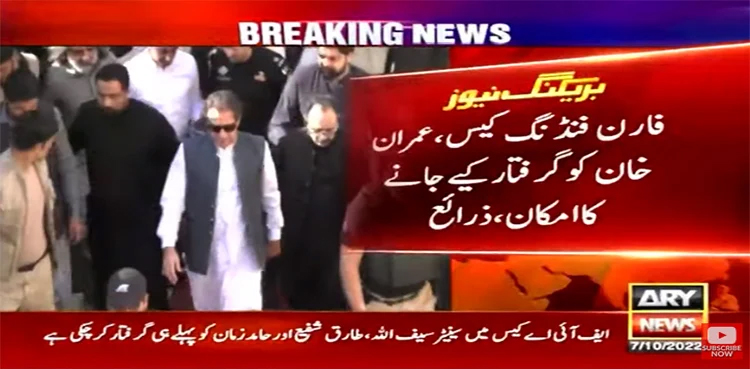
The Election Commission of Pakistan bench in its reserved verdict said prohibited funding against PTI had been proven. ECP, in its unanimous verdict, ruled that the party received funds from business tycoon Arif Naqvi and from 34 foreign nationals.A three-member bench headed by Chief Election Commissioner (CEC) Sikander Sultan Raja, comprising Nisar Ahmed Durrani and Shah Muhammad Jatoi announced the reserved verdict.
On August 02 this year, the ECP in the prohibited funding case — previously referred to as the foreign funding case — against the PTI, stated that the party did indeed receive prohibited funding.
In the verdict, the commission noted that the party “knowingly and willfully” received funding from Wootton Cricket Limited, operated by business tycoon Arif Naqvi. The party was a “willing recipient” of prohibited money of $2,121,500, it said.
The ECP said that the party “knowingly and willfully” also received donations from Bristol Engineering Services (a UAE-based company), E-Planet Trustees (a Cayman Islands private registered company), SS Marketing Manchester (a UK-based private company), PTI USA LLC-6160 and PTI USA LLC-5975 which were “hit by prohibition and in violation of Pakistani laws”.
The PTI, however, claimed that all money it received was actually donations from Pakistanis living abroad and did not fall under the premise of illegal funding.
The FIA, subsequently initiated probe against the PTI and registered a case naming Imran, Sardar Azhar Tariq Khan, Saifullah Khan Niazi, Syed Yunus Ali Raza, Aamer Mehmood Kiani, Tariq Rahim Sheikh, Tariq Shafi, Faisal Maqbool Shaikh, Hamid Zaman and Manzoor Ahmad Chaudhary as signatories/beneficiaries of the PTI account in question.
Later, the Islamabad High Court (IHC) had granted the PTI chairman protective bail in the case and transferred the case to a banking court.
Amendment in NAB law
Several political parties were demanding amendments in the accountability mechanism in the country while criticizing several aspects of the law governing accountability.
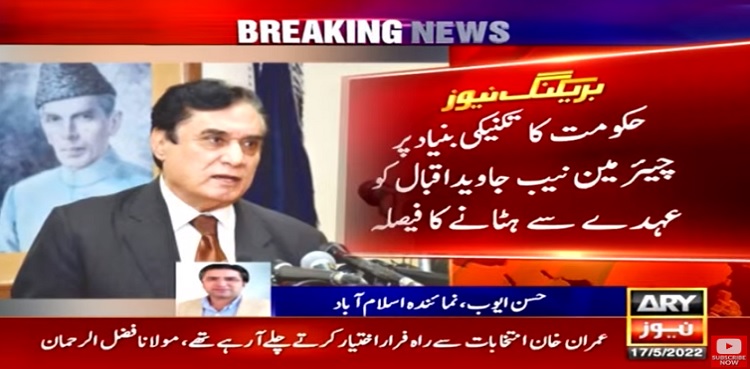
State Minister for Law and Justice Shahadat Awan presented the National Accountability (Second Amendment) Act, 2022, in the lower house to further amend the law regulating the National Accountability Bureau (NAB).
According to the bill, the offence of corruption and corrupt practices as per the National Accountability Ordinance (NAO), 1999, will be tied to the value of Rs500m.
The bill also strips the president of his authority to appoint judges of accountability courts in consultation with high court chief justices.
“A judge shall be appointed by the federal government after consultation with the chief justice of the high court concerned,” the bill stated. As per the bill, the service tenure of Prosecutor General NAB can be extended by 3 years.
The bill also amended the Section 16 of National Accountability Ordinance, 1999 (NAO), stating that an accused will be tried for an offence under the ordinance in the court under whose territorial jurisdiction the offence was alleged to have been committed.
Meanwhile, in an amendment to Section 19E, NAB’s authority to allow surveillance with the help of a high court has been withdrawn, including any assistance from government agencies to be used against the accused in the trial.
“Any person called to provide information in relation to an offence alleged to have been committed will be informed of the allegations against them so they can file their defence in court,” the bill stated.
Moreover, Chairman NAB will now be able to recommend the termination of the reference before the indictment.
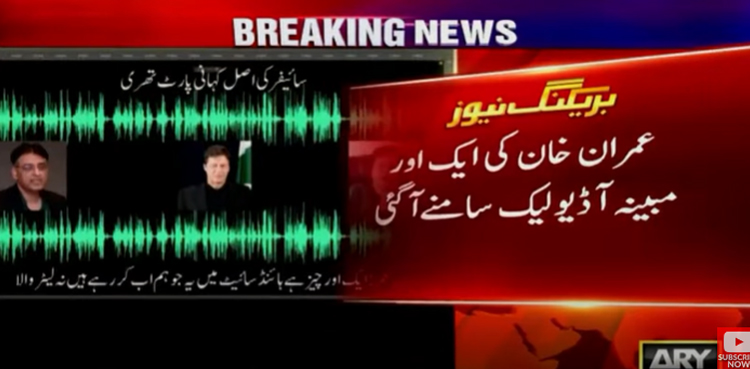
Prime Minister Shehbaz Sharif ordered the formation of a committee to investigate the leaking of several audio files released and a review of cybersecurity at the prime minister’s office.
The National Security Committee, comprising Sharif himself, top military and government officials met to discuss the audio leaks and ways to ensure fool-proof security at the PMO and other important government offices.
An audio file purportedly featuring Imran Khan surfaced on social media when he was the prime minister. In the audio file lasting just over 100 seconds, Khan is talking to a top bureaucrat about a “cypher” or secret cable sent to Islamabad by the then Pakistani envoy to the US. “We only have to play it up. We don’t have to name America. We only have to play with this,” he could be heard saying.
Days before he lost a no-confidence vote in parliament in April this year, Khan had alleged a “foreign conspiracy” being hatched by the US to overthrow his government. Islamabad and Washington have denied the allegations.
It is unclear if the file about Khan is part of the same tranche of the PMO leaks aimed at incriminating the incumbent government.
PTI was also the target of two other leaks when purported telephone conversations between former finance minister Shaukat Tarin and two of his provincial counterparts were released. Tarin, who confirmed the authenticity of the conversation, could be heard discussing the International Monetary Fund bailout package with the two ministers.
Following the audio leaks, the federal cabinet approved initiating the FIA probe and legal action over the audio leak about the cypher. A special committee had also been constituted to probe into the audio leak on the cypher. The cabinet committee had recommended legal action in a session on October 1.
The leaks started on September 24 when multiple files of purported conversations, allegedly recorded in the PMO, emerged online. They apparently showed Sharif and other ministers talking about official matters. In at least one instance, the ruling Pakistan Muslim League-Nawaz party’s vice president Maryam Nawaz Sharif could also be heard.
As soon as the files began circulating on Pakistani social media, Information Minister Marriyum Aurangzeb played down the matter, saying the files have nothing incriminating or illegal in them.
At a news conference, however, Shehbaz Sharif called the leaks a “very serious lapse” and announced the formation of a high-powered committee to probe the incident.
“This is a big question mark. Who will now come to Pakistan to meet the PM in the PM House? Be it a friend or a sympathiser, they will think twice about if they should mention anything sensitive or not. They will think 100 times, wondering if these conversations will be recorded,” the prime minister said.
At least four different audio files purportedly recorded in the PMO have been leaked so far.
The first file included a conversation between Sharif and an unnamed government official, discussing the import of industrial machinery from India.
Another file contains a purported conversation between Maryam Nawaz and Shehbaz Sharif, discussing the performance of former finance minister, Miftah Ismail, who resigned later. In that audio file, Maryam could be apparently heard complaining about Ismail’s performance and expressing her wish for the return of Ishaq Dar from London, who later replaced Ismail as the finance minister.
Dar, a 72-year-old veteran politician, who is a relative of Sharif family, returned from London where he has lived since 2017 in a self-imposed exile following corruption allegations against him.
The mystery however, remains under the carpet, as no official statement on how the audio files were leaked and who recorded them in the PMO.
Imran Khan makes history by winning seven NA seats
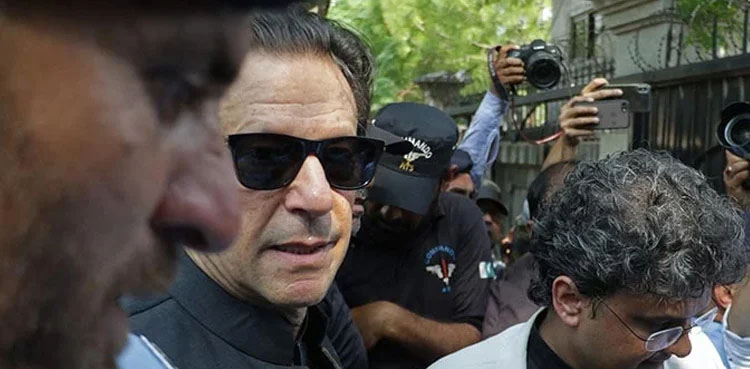
Pakistan Tehreek-e-Insaf (PTI) Chairman and former prime minister Imran Khan made history by emerging victorious on seven National Assembly seats in by-elections among eight he contested.
PTI chief Imran Khan has won by-elections in Peshawar, Mardan, Charsadda, Faisalabad, Karachi and Nankana Sahib.
PTI won in NA-31 Peshawar, NA-22 Mardan, NA-24 Charsadda, NA 108 Faisalabad, Karachi’s NA-239 Korangi, and NA-118 Nankana Sahib-II as PTI Chairman Imran Khan defeated ruling coalition candidates in respective constituencies.
However, PPP clinched NA-237 Malir seat in the by-election. PPP’s Ali Musa Gilani defeated Meher Bano Qureshi, daughter of PTI leader Shah Mahmood Qureshi in In NA-157 in Multan.
The election commission held by-elections on eight seats of the National Assembly and three Punjab Assembly seats on October 17.It is to be mentioned here that PTI members resigned from the National Assembly after the no-confidence motion against Imran Khan succeeded and ousted him from the Prime Minister’s office. The party members refused to join Parliament and requested that their resignations should be accepted.
Speaker National Assembly, Raja Pervaiz Ashraf accepted resignations of 10 PTI MNAs, which led to by elections on vacant NA seats.
Imran Khan’s disqualification in Toshakhana reference
The Election Commission of Pakistan (ECP) in its verdict of the Toshakhana reference against Imran Khan on October 21, declared him disqualified.“As per the statement of Imran Khan he had purchased the gifts from Toshakhana paying 21.564 million rupees while the Cabinet Division said that the gifts had a value of 107.943 million,” the ECP judgment read.“Imran Khan’s bank account details were received from the State Bank of Pakistan. He had 51.6 million rupees in his account at the end of the 2018-19,” decision read.“The amount in his bank account was around half of the value of the state gifts.” “Imran Khan was bound to declare the cash and bank details in his returns but he didn’t declare it,” ECP decision read. “His returns do not meet the bank record. He didn’t explain that the mistake in his returns was unintentional. Imran Khan accepted that he didn’t declare the gifts, or the money earned from their sale in Year 2019-20,” according to the verdict.“All details have been declared in his tax returns”, he said. “The election commission and the FBR are two separate state institutions, ” ECP said.The election commission declared Imran Khan disqualified and unseated from the National Assembly seat, under Article 63, 1(P), over submitting a false statement and declaration.The judgement added that the former premier was found to be indulged in corrupt practices under sections 167 and 173 of the constitution. “A criminal proceeding will be initiated against him over filing a false statement.”“His disqualification under Article 63, 1(P) has been for his current parliament membership”, the ECP said in its 36-page detailed judgment of the reference.
